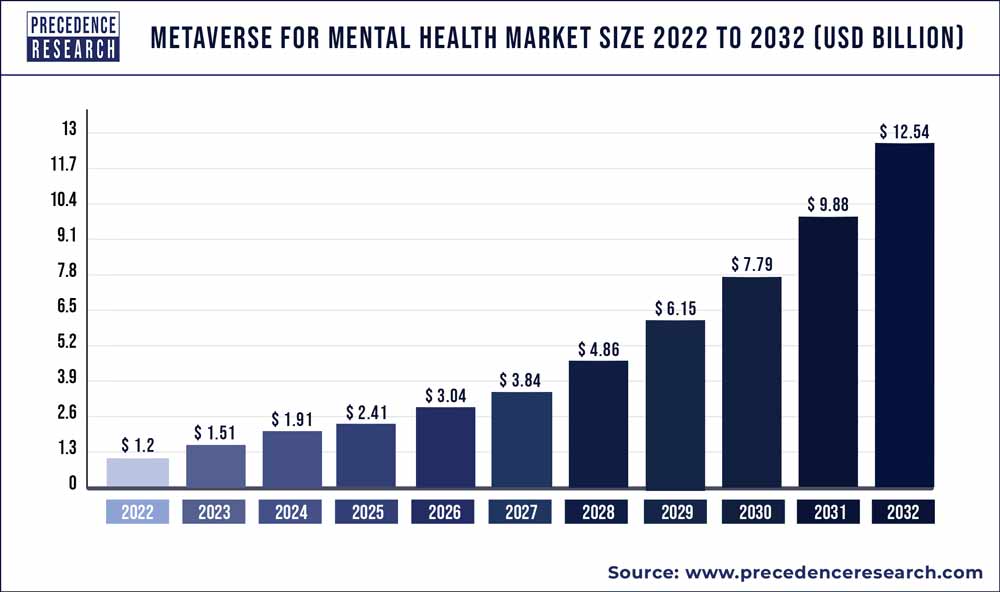The metaverse for mental health market size is poised to grow by $ 12.54 billion by 2032 from $ 1.51 Billion in 2023, exhibiting a CAGR of 26.50% during the forecast period 2023-2032.

The "Metaverse for Mental Health Market" is an emerging sector within the broader landscape of the metaverse, focusing specifically on applications and platforms designed to address mental health concerns. As the metaverse evolves into a multi-dimensional digital space, the integration of mental health solutions reflects a growing awareness of the importance of addressing psychological well-being in virtual environments. This market aims to leverage immersive technologies and digital experiences to enhance mental health support, therapy, and overall well-being.
Get a Sample: https://www.precedenceresearch.com/sample/3543
Growth Factors:
-
Digital Therapeutics Integration: The incorporation of digital therapeutics within the metaverse for mental health is a significant growth factor. As virtual spaces become more sophisticated, they offer unique environments for delivering therapeutic interventions, ranging from mindfulness exercises and stress management programs to virtual reality (VR) therapy sessions.
-
Technological Advancements: The continual advancement of technology, including augmented reality (AR), VR, and artificial intelligence (AI), plays a pivotal role in the growth of the metaverse for mental health. These technologies enable the creation of more immersive and effective mental health interventions, providing users with diverse and personalized experiences.
-
Increasing Mental Health Awareness: A growing societal awareness and destigmatization of mental health issues contribute to the expansion of this market. People are increasingly seeking digital solutions for mental health support, and the metaverse offers a promising platform to access resources, connect with support communities, and engage in therapeutic activities anonymously if desired.
-
Remote Accessibility: The global shift towards remote work and virtual interactions, accelerated by events like the COVID-19 pandemic, has increased the demand for remote mental health solutions. The metaverse, with its ability to transcend physical boundaries, becomes an accessible and convenient platform for individuals seeking mental health support from the comfort of their homes.
-
Corporate Wellness Initiatives: Businesses are recognizing the importance of mental health in the workplace, leading to the integration of metaverse solutions as part of corporate wellness programs. Virtual environments can offer employees stress-relief activities, mindfulness sessions, and other mental health resources, contributing to a healthier and more productive workforce.
-
Collaboration with Healthcare Providers: Partnerships between metaverse developers and healthcare providers are facilitating the growth of mental health solutions. Integrating these platforms into existing healthcare systems allows for a more holistic approach to mental health care, ensuring seamless communication between virtual and traditional healthcare services.
Opportunities
Opportunities within the Metaverse for Mental Health Market include the creation of immersive environments designed to alleviate stress, anxiety, and other mental health challenges. Virtual therapy sessions, guided meditation, and interactive support groups could become commonplace, providing accessible and inclusive mental health resources. The metaverse offers a unique platform to connect people globally, fostering a sense of community and understanding in a shared digital space.
Challenges
However, challenges in this market may arise in terms of ensuring the privacy and security of users' sensitive information. Striking a balance between technological innovation and ethical considerations will be crucial for the success of mental health initiatives within the metaverse. Additionally, addressing issues such as digital addiction and potential disparities in access to metaverse mental health services will be essential for creating an inclusive and equitable digital mental health landscape
Metaverse for Mental Health Market Players
- Facebook, Inc. (Meta Platforms, Inc.)
- MindMaze
- Relax VR
- Psious
- XRHealth
- Limbix
- Virtue
- PsycApps
- VRChat
- vSpatial
- Ovation VR
- Oxford VR
- Tribeca Care
- Luminous Cities
- Floreo, Inc
Segments Covered in the Report
By Component
- Hardware
- Software
- Service
By Application
- Therapy and Counseling
- Mental Health Education
- Mindfulness and Meditation
- Others
By Technology
- Virtual Reality (VR)
- Augmented Reality (AR)
- Mixed Reality (MR)
By End User
- Individuals
- Mental Health Professionals
- Healthcare Institutions
- Others
By Geography
- North America
- Europe
- Asia-Pacific
- Latin America
- Middle East and Africa
Contact Us:
Mr. Alex
Sales Manager
Call: +1 9197 992 333
Email: sales@precedenceresearch.com
Web: https://www.precedenceresearch.com
Blog: https://www.expresswebwire.com/
Blog: https://www.uswebwire.com/


0 Comments